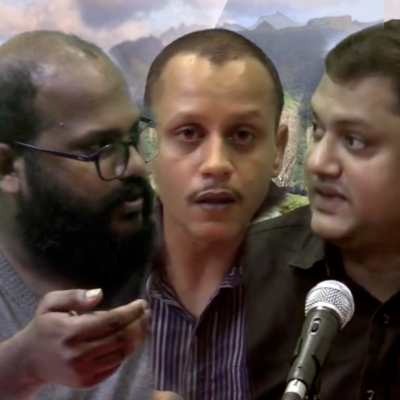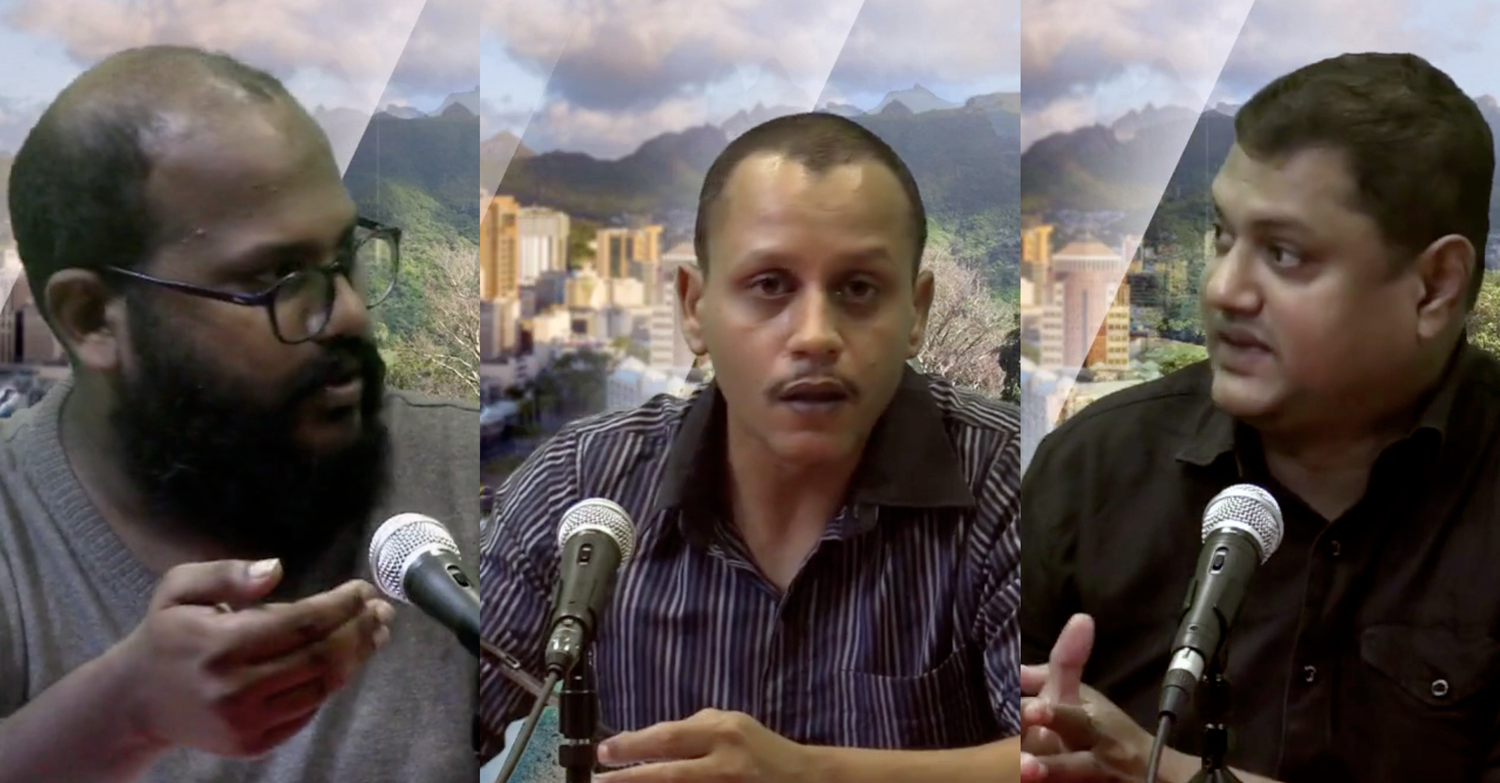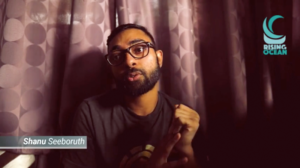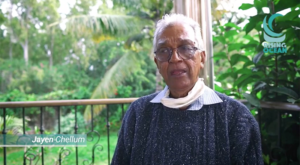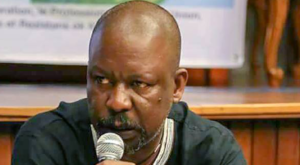The budget 2021/2022 was presented on Friday 11th of June and three days after, Ki Nouvo Moris’s broadcast organised a discussion in line with this. Michel Chiffonne received Kugan Parapen, economist and member of Rezistans ek Alternativ, and Rajen Valayden, Chief editor of the newspaper Capital and political activist for an in-depth analysis of measures announced.
The host introduced the debate by citing the challenges we are facing. He expressed the expectation of the people for a reorientation and the responsibility to remember that we are a republic of which Rodrigues and Agalega are also part.
The budget presentation
Rajen spoke about the understanding of the term ‘budget’ which has become an annual event orchestrating political speeches filled with propaganda in Mauritius. He drew a parallel with the situation of a patient who needs to be diagnosed in order to be given the right treatment to emphasise the importance of the evaluative dimension of a budget. Moreover, he mentioned that a budget is basically an accounting exercise clarifying revenues and expenditures to indicate the direction taken by the country. He indeed acknowledged that the risks of cyclical changes, unexpected crises such as the Covid-19 are not ruled out in this exercise but found it inadmissible to blame the Covid-19 whenever each time a problem arises;
- The economic structure of our country has been shaken since 2015 and it is not the fault of Covid-19 which is an ongoing concern. Politics – economics = comics. There was a real mix; it is from a clear vision that strategies flow.
Likewise, Kugan explained that according to the Minister, Mauritius is sick but it is a temporary illness. He related that most economic observers have acknowledged that the Minister has missed his appointment with history; the systemic problems facing the economy before the pandemic have not been addressed. With this in mind, he gave a detailed overview of the actual triple crisis we are facing: the economic crisis itself, the recession, the currency crisis, and the public debt crisis.
- Even if the State’s debt is mostly owed to the Mauritian population itself and for the countries to which the State owes money, it is beneficial to them that Mauritius is in this situation as they could use it as a bargaining chip later on.
Kugan commented that he felt that the expectations of the people and the moment were not addressed because the gravity of the situation was not recognised in the minister’s speech.
Hypocrisy in the capitalist system… is enough being said about forces that control and decide everything?
With Air Mauritius almost on its knees, Covid-19 still around and the number of cases increasing Michel has wondered how this tourism-oriented reopening will be accomplished.
Rajen decried the hypocrisy around the tourism sector;
- It is not when the situation in Mauritius is better that tourists will come back, it is when the market in their countries is stabilised that they will be able to afford because Mauritius is not a cheap destination. A training course for the people of the hotel industry, for the improvement of their value towards diversification and multi-skilling, making us more marketable, should have been proposed during these 24 months. Instead, they chose to give money to the hotels to pay back the banks they themselves own.
He also raised the hypocrisy around the figures which are distorted from the very beginning. For instance, he unfolded the lack of honesty and the political interference, and the manipulation of public opinion on the part of the government.
Kugan explained the hypocrisy in the local market;
- Capitalism says that everything depends on demand and supply but if we take the example of chicken production, with Covid, hotels could not buy it and there was a surplus of production by a thousand tons. However, the price of chicken did not fall.
He later underlined the « coincidence » between the rescheduling of the big companies and this drain construction project.
Taxation, debts, and inflation.
At time of deabte the current national news is the some 6 billion debt (with interest) of the State to Betamax.
Kugan reminded us that debt(amounted up to 110%) is increasing and it is normal that there is a lack of money. Nonetheless, Betamax will have to be paid, there is no way out of it he further stated;
- Emergency funds exist but the government had already started to draw on them prior to Covid. The Minister seems to be relying on the reserves of parastatals to fulfill some of his ambitions. The challenge of covering the recurrent expenditure is a mirror image of the problem. Another perspective is that of revenues; 75% of taxes come from the pockets of the population while the tax on companies does not represent a very large figure.
Rajen added that mechanisms exist for countries to buy back such debts and that organisations such as CEB and CWA that provide services are not supposed to generate profit.
Michel asked if economically there is not a transfer of the burden on the working class since taxes do not seem to concern the richest.
Significantly, Rajen claimed the refusal of economists to talk about the shadow economy which he estimates at almost 70% of GDP.
- The shadow economy is the informal economy, dirty money. We must have the courage to tackle it because cosmetic measures will not cure the problems: the economy is in chaos. The country is bankrupt and the parallel economy is playing the role of an artificial ventilator.
Kugan pointed out that there is a difference between the increase of a product itself and the imposition of the tax by the government. He mentioned the huge amount of money circulating in the world at the moment, accounting for the surge in commodity prices.
- Mauritius has been left behind in the international economic recovery because it depends mainly on tourism and is far too dependent on imports.
Kugan informed us about the depreciation of the rupee which is not controlled by the government but by a managed float. After the Gold Standard mechanism of Bretten Woods failure in England, it is now market forces that determine the value of a currency he later added.
- The Central Bank has the mandate to intervene from time to time in this free trade to try to target the rupee around a certain range; it tries to stabilise it. The demand for the currency has fallen dramatically as we continue to buy in dollars when we import and sell in rupees.
Mauritius as a coloniser towards Rodrigues and Agalega
In response to Alain Tolbize intervention**, Kugan recalled that Rodrigues has a local government and that it is a constituency by itself. He put forth the state budget which does not allow each constituency to have its own budget and the fact that it is therefore up to the government to ensure that the needs of all the people of the Republic of Mauritius are adequately addressed. He stated that the water problem has been going on for several years in Rodrigues and it is absurd to ask them to pay for a right.
Rajen supported that Rodrigues must come forward with formulas and that the least we can do is listen to the people. Furthermore, he talked about the privatisation of water which will be done with the help of SPVs, special purpose vehicles and deplored that the time has come to make public the representations up to the budget.
- The government is only the facade of the budget, but behind that there is a whole system which favours a status quo.
Rajen pointed out the number of contradictions in this budget by reviewing two big projects in the last 5 years: the metro express and what is happening in Agalega, both of which are exempt from EIA. In the past, he had proposed to study the capacity that we can continue to build but this is no longer possible. 11.7 billion has been allocated to the construction of drains in the south east of Mauritius because of the floods and Rajen revealed the lack of people involved in the relevant institutions;
- What if there were flash floods on the metro route for example? The worst is yet to come. There are no plans for drains, they are absorption pits. As long as there are no institutions with well-defined roles, things will be complicated.
Energy production
Michel observed increase in energy imports and the 60% control of the private sector over power generation. Kugan said that Mauritius is a victim of being an island, but not from the point of view of resources but of mentality;
- The belief that there are no alternatives possible has been instilled in the Mauritian sub-conscious.A crisis has to occur and ecological awareness has to become mainstream for renewable energy to be considered. They don’t want to talk about it because it goes against the export economy lobby.
Despite the end of their contracts in 2020, the same people will be in charge of power generation through renewable energy and Rajen related an anecdote to make us understand that the mindset in the highest circles considers the country as their own.
He also referred to the Powershift Campaign conducted in 2006 for a battle against the City Power Station, against coal. Michel built on this by revealing the projects submitted to the CEB around the agri-solar farms which could have become an economic pillar where every citizen of Mauritius would have been a part of.
Kugan evoked the urban terminals, energy centres where there will be no loss of money and where the collective ownership would have been perfect.
Exploitation
Employment is used as a Damocles sword. According to Rajen, exploitation is the link between all the issues that have been raised. The provision to curb dismissal ends on the 30th of this month and the minister did not mention anything about it in the budget. Rajen reminded us that this law was enacted following protests.
Kugan predicted the revelation of the atrocities of this government with the Covid-19 Act and sighed the lack of ambition in this budget with the increase in unemployment.
Michel spoke about the reduction of our liberty rights as citizens and the launching of movements to act against this.
- We can’t protest because we can’t get out. The number of people gathered together is 10 maximum, while the opening of the borders is foreseen, with the arrival of tourists who will be able to enjoy our beaches while their access is forbidden to Mauritians.
Actions to meet together
Rajen insisted on an update of the actions to be taken;
- Going out on the streets is one action but there are other ways to assert your rights. We need to find other ways to come together and if partial containment is maintained disobedience will have to take place. Nothing has changed for the rich people and our silence sometimes makes us complicit in this injustice.
Kugan joined Rajen by noting the referral of the municipal elections, which shows a lack of trust in the people;
- The citizens must be present in the streets again. It will be difficult to achieve the 9% growth rate and impossible to achieve the debt reduction that the Minister has suggested. The future looks bleak.
Hope therefore lies in bringing people together and Michel concluded this debate by quoting a sentence from Rajen:
We don’t ask for rights and power, we just take them.

